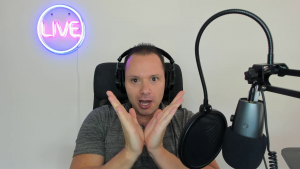Video Podcast Transcript:
Hello, Tyler DeWitt here, national speaker, and I’ve spoken for the world’s largest digital marketing conference multiple times in the masterclasses with closing keynotes, combined with workshops in front of enterprise clients, or attendees, I should say. So, during this video podcast, I’m going to talk about the power of storytelling in digital marketing, and why you should be utilizing it.
Stories should be built into your marketing, whether it’s in your bio, about page, around your products, on your blog, even your video podcast. You can create stories if you have a podcast. So, storytelling is a powerful thing, the reason being, we’ve been telling stories since the beginning of time. We used to sit around the campfire at night back in the caveman days, more or less, telling stories. That’s all we did, we would share stories about how we accomplish this task, we would share stories about our challenge, then we had a solution.
People have been doing this since the beginning of time. If you recall, your parents were even telling you stories when you were growing up. People are always telling stories, we love stories. We love watching movies, and some of us even listen to music, and we listen to it word for word; other people might just listen to the beat. Some of us do listen to it word for word, depending on what you’re listening to. It sounds really good, right? It gets your energy up.
So, people like to read stories they can relate to. When someone comes across a story online, sometimes they’re like, well, that’s me, that’s me, I have the same problem, and this person did this to solve, their problem. They come across a challenge, for example, they were wanting to lose weight. They came across a weight loss article. Then Jack or Jill, whoever it may be, writes a story about how she or he was struggling to lose weight, and how they resolved it. They had the challenge of they just didn’t feel confident, their self-esteem was low, and now they’re back out dating.
This person might come across a story, and they’re in the same mode, they’re getting ready to sign up to a dating site, or they’re out, back dating again, they’re seeing people again, or looking to date. So, they read this story and then all of a sudden just, BAM! It clicks in their head, and they engage with it, and it keeps their attention.
In this story, this person is talking about what they did to lose weight, it could have been dieting, exercising, or could have even been taking supplements. Now think of it, that’s key right there. They could even utilize yoga. So, in the story, Jack or Jill or whoever wrote the story, then moves from telling a story into selling a product or service. Starting to add up now? You’ve probably come across things like this online.
We’ve all been telling stories, like I said, for a long time. Let me share a story with you. Back in early 2008-2010, actually even before that, we were writing up review pages and telling stories. We didn’t call it storytelling. We called it advertorial review pages, this whole storytelling word just started emerging not too long ago.
One person that made it really popular was Carmine Gallo. I don’t know if you’ve ever heard of him. He’s an instructor at Harvard. And he’s very passionate about storytelling. I would highly advise that you read his book if you haven’t. I even spoke about storytelling in the master classes that I did, in San Francisco. I talked a little bit about it in San Diego too.
Anyway, we used to sell stories around supplements. And one day I was sitting there thinking, when we first started our supplements, we had a few diet products. We started years back because we were marketing for a company that was selling supplements, and they had stories built around their supplements, review pages, but we had to change it up. Well, we quit working with this company because they sold, and so we took a pivot in that area of our business. We went to have our own supplement manufactured. Well, we were only doing like $500 to $1,000 a month, right? Not too much revenue.
I came up with an idea about us sharing stories about other people that have used the ingredients, or products, that we have, and we share a story about how the supplement helped us lose weight through energy, and we compared it to other products out there. So, somebody was searching for Hydroxycut. Eventually they came across to our product, because Hydroxycut was always known to give you the jitters and make you all “bingy,” speedy, and everything else. A lot of people didn’t like that.
So, we created a story on how our product was not like that. Then sales just started rolling in as soon as we got it optimized in Google. Actually, we didn’t really do much optimization, the content was pulling up in Google. And we started generating some sales, like $3000-$5000 month. Well, before the end of the year, I was up to doing 40, 50, $60,000 a month in profit. I mean, it took off like a rocket.
This was all through storytelling. People are still doing this today. People are telling stories all the time around products. If you notice, people have learned over time, that this is what makes people click, this is a key driver in business. So, my point is, what I’m trying to tell you, if you’re not utilizing storytelling, make sure that you are. Make sure you hire a good writer to tell stories.
You can tell stories through videos, you can tell stories through Instagram somewhat, the best place to tell stories is through content. And you can do it through video podcasts, too, or on YouTube. You have to have a way of getting your story out there, and you have to be able to promote it and advertise it.
Sometimes, you might be ahead of your time and have a new product. For example, like I was saying, people were searching online for Hydroxycut, Lipozene, SlimQuick, all these diet products, and we were showing up in organic search. I noticed that we were starting to drive sales from that because I looked into our Google Analytics, and I saw that the trademarks were being typed into Google. Well, I went out, and we did a link building campaign targeting those keywords, and boom, it just blew up to the top five in Google.
So, your whole blog, if you have a blog, your whole blog should be developed around storytelling, every time you write a blog, try to share a story. There’s different types of content, informational, educational content, then there’s storytelling content. If you can write a story around your products or services where people have used it, do it. Interview this person, tell them to share a story, on how your product resolved their challenges, and so many different people in the industry can use this, attorneys, doctors, yoga, supplement companies, entrepreneurs, freelancers, business owners, consultants, you name it.
An attorney might share a story as someone that something happened to, maybe an accident, and how they boost their settlement with the insurance company, or whatever it may be. There’s tons of stories that you share, but they have to be very engaging and very emotional, and don’t try to sell too soon. Your point in the story is to help provide the solution to the content, and share how the solution applied to the challenge. You want to share the challenge first, and then you want to move into the solution. And that’s when you can start selling yourselves, or your product or service.
So, as mentioned, storytelling is a growth hacking tool. The reason I keep bringing the blog up, if you can build your blog around stories, chances are, you’re going to find something that’s going to take off in there. Just remember that every story that you tell, is not going to blow up, but it’s definitely not going to hurt to try anything, it’s gonna increase your odds, it’s going to increase your chances of success.
When you hire a writer, try to hire someone that’s very familiar with analogies and metaphors. This is one thing that I brought up in the conference, when I was in San Francisco, a good writer can do you wonders, because let me tell you, I wrote the story up at first, it didn’t do so well. I had someone else write the story up and it took off. The conversion rates were double.
This was back when you could do trademark bidding on Google. At one time Google was allowing trademark bidding where you could bid on your competitors’ trademarks. So, what we did was bid on our competitor trademarks. The story that I wrote up was only converting about 3% per 100 visitors. I had a professional copywriter, rewrite our story and it blew our campaign up to about 7%- 8% conversion.
We just kept hacking and hacking, changing it up, reinventing the way we were doing it. We used Google Ads to see what our conversions were, but SEO was originally where all of our traffic came from. Then we started bidding on PPC and doing other things like, media buying and email marketing.
That’s another thing, you can share your stories through LinkedIn, Facebook, email marketing, SEO, PPC, you can remarket it. So, say for example, someone read somebody’s story online through your website, and they didn’t convert, why not share another story to them through Facebook. The second story might be a little more engaging for someone that has already visited your site. They converted the form, why not remarket and retarget to that user again, and build those stories into their heads and keep building them into their head. Eventually what’s going to happen is they’re going to buy.
Usually, storytelling is so powerful that it will get people just to click right away. We get people online that read our stories, sometimes, in our case studies or whatever it may be, they’re like, that’s me, that’s me. I’m having the same problem. They call and they’re like, look, I want to hire you, I want to hire you. I want to hire you. It’s like, whoa, okay. Okay, let me get the contract ready, you know what I mean? That’s how powerful stories are for people, it just ignites them. It makes them take action. So, that is the power of storytelling in digital marketing. Thank you.
A Top Performing Marketing Executive, Consultant, and Speaker.
Tyler’s success at helping clients scale has resulted in numerous speaking engagements. Tyler has spoken for numerous tradeshows including DigiMarCon which is one of the world’s largest digital marketing conferences.
Read Tyler’s BIO


